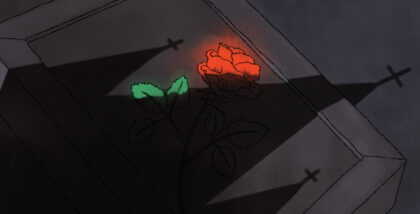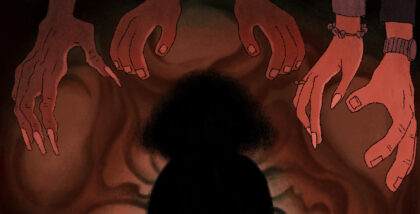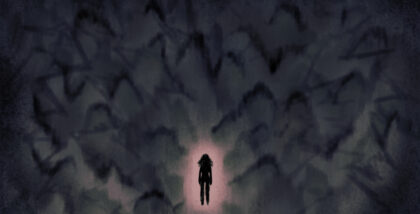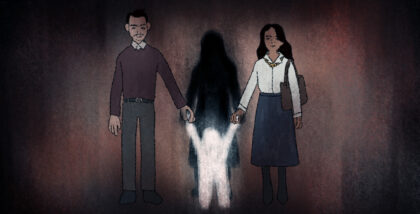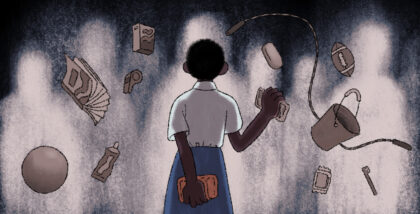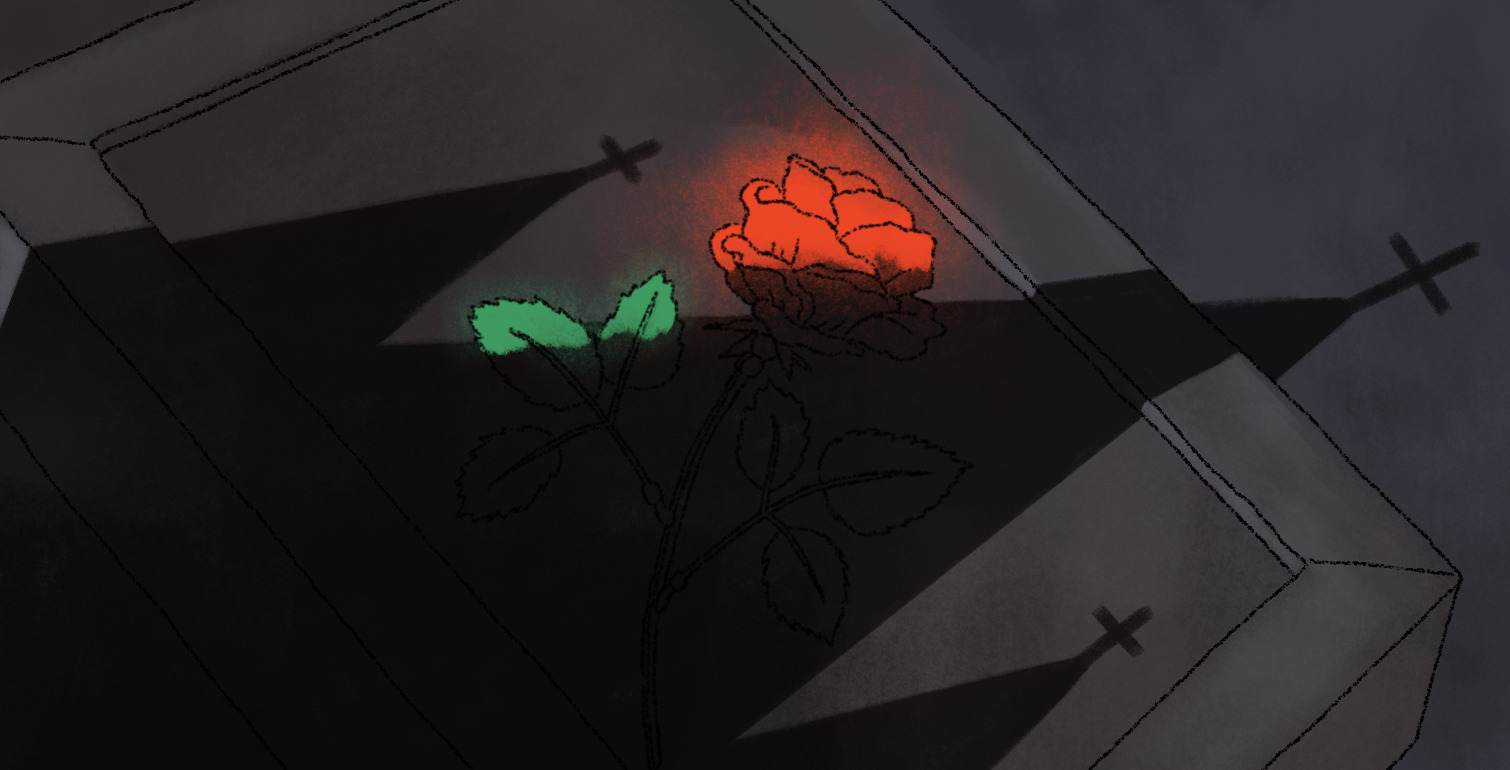 Art by Sarula Bao
Art by Sarula Bao
It was the warmest All Saints’ Day Pani could remember. She spent the morning picking weeds that had recently sprouted around her daughter’s grave, every so often rolling up her sleeves with the bridge of her nose. She collected flowers that had wilted into unseemly shapes in their vases, like chewed bubblegum, and placed fresh, specially-ordered chrysanthemums at her daughter’s head. At her feet, she lit several lanterns. Since the grave was small, after Pani finished showering it with gifts, barely an inch of stone remained awake.
Shadows began to stain Pani’s thick blue dress. She wore a common look, her face resting, showing neither sadness nor triumph. Exhausted, she took a seat on the graveside bench for which she and her husband had paid along with the engraved marble:
Let God push your boat out into the deep waters, toward the unfathomable depths of the interior life.
Pani had chosen this St. Faustyna Kowalska quote so that a boat would occupy Dziewczynka for eternity. Plus, she liked the image: a girl lily pad, a girl cup of coffee waiting for her father to come home, a girl blanket stretched out over her sister’s or brother’s body.
Sometimes, she caught old Mrs. Pawelska sitting on Dziewczynka’s bench to talk to her husband three graves away. Her prayers must have been as loud as a football match. Pani said nothing to old Mrs. Pawelska because she knew bodies grieved, too. They became weak with sadness. She wouldn’t be a good Catholic for Moving a Mourner—the title she imagined for her daughter’s first poem published in heaven’s Heathrow Gazette.
The name Heathrow came from a line in Pani’s favorite poem, “My Translators,” by Ewa Lipska, which read: “My—Their— / voices. This hovering over books. / Making predictions from the abyss of pages. / Syllables lifting off from Heathrow.” Pani liked this poem not only because it presented a cacophony—Lipska writing about her translators who then communicated with Lipska by translating her text—but also because she liked to think her daughter’s poems were translated from heaven’s language to an earthly one. “And I / am in love with so many languages at once.” She imagined that her daughter said the same about her translators: “My translators. They: my sequel.”
Underneath the Kowalska quote, the date 01.01 appeared. It was a lonely date with so much potential, like a parking structure in a desolate town. An anomaly—all of Dziewczynka’s grave neighbors had two dates on their graves. But her birth date and death date were not parenthetical, cradling between them a long, fulfilling life, nor a short, rebellious one. If only Pani could expand the cemented time into hours, not days, her daughter’s life would have meaning. Instead, the 01.01 signified a single event, like a concert, performance, or holiday.
*
To be a good mother, a woman must laugh genuinely with her children. Pani learned this early on as a mother by observing a woman and her son watching a video on the boy’s phone. They were on a train. It was early in the morning; orange began to breathe life into the day. Her sincere laughter and his blatant appreciation filled the car. Pani could tell her laughter was sincere because it didn’t sync up with the boy’s; she laughed at parts she thought were funny. And it was loud, uninhibited, impolite. The only time she had witnessed mothers laugh like that was at the expense of their own children. They had said something silly; they had mistranslated life.
With her two youngest, Pani played a game she called Snake Pit before saying goodnight. She knelt in the middle of the bed, while son and daughter tried to crawl or tumble their way from one side to the other. Usually, she caught at least a foot, a shoulder, and the three of them collapsed into a puddle of tears. Afterwards, in the mirror, she examined the temporary lines the laughter had etched into her face, while remembering how confusing her laughter had been before she became a mother—a laughter mostly reserved for men. She used to be very beautiful; men craved to hear her soul escape her helplessly, especially when they had caused it to happen. They complimented her voice, which wasn’t a singer’s voice, but a radio host’s, a hero’s, a lover’s. She touched her cracked lips, ran her finger along the umbrella-like bags under her eyes to squeeze out the last juices of energy. Her beauty was now an old town in a modern city: there for the tourists, but not all that useful. It had long stopped getting her husband to concede to her will.
With Dziewczynka, it was different. Pani carried a red leather journal to jot funny moments that happened over the course of the year, and then recited them to Dziewczynka on All Saints’ Day. Pani assumed she was watching over their family from heaven, so she kept the notes short, just enough to jog her daughter’s memory:
Your father and I brainstormed names for your baby sister by listing pretty-sounding verbs. We got as far as Alleviate and Ameliorate before we exploded into laughter. Tears ran down your father’s face, like little scraps of lace.
Little Szymek thought he heard “President Dupa,” instead of “Duda.” He asked, “Is our president named ASS?”
She moved onto prayers:
I never got the chance to really meet you, but . . .
I wonder what you’re doing up there in heaven, and if . . .
Your brothers and sisters, your father and I, love you very much, so . . .
The prayers were unfinished, like she was, and what is sent unfinished to heaven—a life—becomes sacred in its mystery. Pani could not finish her sentences because there was nothing left to say. The endings had fallen out of her purse and tripped understanding, allowing fear to pull ahead.
After Pani gave birth and death on the same day, people referred to her daughter as her “late child.” She hated this and often lashed out at them for their proper language when HER DAUGHTER WAS DEAD. She tried to convince people that Dziewczynka was not late to anything. Then she cursed the people who were late to her funeral. Her anger visibly expanded, causing her black dress to show white at the seams. She pointed her shaky finger at the clock. She tried to believe she was no more to blame for her death than a bystander not decimated by a bomb.
When she calmed down, her stomach twisted in knots like a swing bullied by the wind. She remembered the pregnancy; she remembered how tough it was to carry Dziewczynka to term. “She was late,” Pani whispered to herself and stifled a sob. Her throat clenched around a breath.
“Goodbye,” she told Dziewczynka at her grave. “I hope I didn’t miss you.”
*
Pani kept a journal during mass. It was a small, pocketsized notebook, but she feared the inside was too bright in the church’s austere lighting. It sent glares to her peace-be-with-you radius, as if it were a compact mirror conversing with the heavens. People generally ignored her scribble-scrabbling. When they didn’t, their comments were overwhelmingly positive, like, “Wow, it’s a great idea to take notes on mass, so you can review them later and pray.” Because she was the church’s volunteer decorator and devout groundskeeper, she did not want to make a bad impression. Little did they know her notes on the homily were minimal:
The priest just said, “All feminists hate you, Catholics.”
And looked more like:
What if mass were practiced in reverse? People would still join hands for peace-be-with-you, just from the other end, like a palindrome. Would anything be that different? We’d spit out Communion . . .
Trying to pick out my daughter’s voice among the choir, her tone, her fingerprint, is like trying to find a life partner. Everyone buzzes to the same song, but recognition is possible. In the future, that person’s voice will be the only voice, and it will be telling you goodnight a million times while you compliment its florals.
She had written this last one thinking about her husband who took her right hand when she was not writing. He held it until they had to kneel. She liked seeing her husband kneel in front of Jesus, a man. She liked watching him swing subtly into a homoerotic body, exorcising the heterosexual man who liked watching her kneel. Sometimes he’d let go of her hand to adjust his glasses. During sex, his glasses never sat out, unlike the problem arm or pained back that sometimes did; his glasses were the real MVP. As he moved into her, they slid down the bridge of his nose, giving him an extra set of eyes. He gazed into her like into a funhouse mirror, and she distorted his image back onto him. Even so, she knew he would never admit to harboring sexual tension for a man, so she did not share her visions. They made her happy where they were, locked in a cabinet in her head.
Sitting at church, she was remembering two different phone conversations she had with her husband: one from when they were first together and did not hang up until four in the morning, and the other from when she was pregnant with Dziewczynka and had just returned from her combined test. She had gone alone because he was abroad in Germany working a construction job.
Scene 1: Be a Better Lint-Brush
Cast: Pani and Lint-Brush
Tears march on Pani’s face like soldiers. She is shaking
uncontrollably, like she does when she’s anxious and drinks.
She does not drink often because of this. She has waited a
half hour by the phone for Lint-Brush to get home from
work. She picks up the receiver and dials his number.
Tears are pooling in Pani’s eyes.
Her head feels swollen, having blown up
two words into perfectly sized balloons:
safety and forever.
Lint-Brush: (Wipes sweat from the right side of his face.)
Hello. Hello?
Pani: Come home.
Lint-Brush: Imagine building a home on a hill.
Each floor with its own balcony, so we could see
both the sunrise and the sunset.
Lint-Brush: What’s wrong? I can’t right now.
Pani: I love that. And also, a garden. I want to
grow zucchini, raspberries, red currants.
And have a dog, name him Ząbek.
Pani: (Ząbek barks at someone passing in front of their
gate. She doesn’t have the energy to call his name. She sits
on her words, as if she were laying an egg.) The doctor
told me . . . she said . . .
Pani: The whole house would be covered in your
hair.
Lint-Brush: (Moves around his friend’s tiny apartment,
readying for a shower. His friend won’t be home for hours,
so he strips in the living room. He speaks loudly into the
receiver to counteract the shuffling noise of undressing.)
You didn’t tell me that was today. How’d it go?
Pani: I told you last night it was today.
Lint-Brush: (Joking.) We talked last night?
Pani: (Ignores joke.) The baby shows signs of a
chromosomal disorder and might not survive.
Lint-Brush: (Laughs.) You could pick it up and
throw it out if it disgusts you that much.
Pani: The doctor wants to do an amniocentesis
to confirm.
Pani: (Nurtures a snarky half-smile on an otherwise sleepy
expression.) Just want you to understand I’m not the
only messy one here.
Lint-Brush: (A long pause ensues as he puts the receiver
down to tug off his devastated work socks.)
Pani: (Yells through her tears.) Are you listening to
me?
Lint-Brush: So, is it empathy or sympathy you’re
after? Which is the one where you know what you
yourself are feeling?
Lint-Brush: (Picks up the receiver quickly after hearing
his wife raise her voice.) Sorry, I was wrestling with
these stupid smell-piles on my feet. Work sucked ASS today.
Pani: There is no such thing! Or it’s maturity.
That’s the one.
Pani: (Sighs. Wishes she were clinging to his shirt.) Please,
listen.
Pani: I love you, Lint-Brush. Be a better
Lint-Brush.
Lint-Brush: (Says jokingly.) You can’t make me into
something I’m not.
Lint-Brush: You were saying . . . the baby . . .
Scene 2: You Can Feel for the Hang-up Button
Cast: Pani, Lint-Brush, Priest
Later that same night, Pani and Lint-Brush continue
talking. At this point, he has realized the rudeness of his
distraction and apologized profusely.
At this point, they are saying their tenth goodbyes.
Lint-Brush: Under Polish law, you are entitled to
a medical abortion.
Pani: (Remembering an American TV program she saw
last week.) Medical abortion? This is my body, Lint.
Not medical marijuana.
Lint-Brush: It’s just like medical marijuana.
It would ease the pain. Your health is at stake.
Pani: (Says in a whooey voice.) You have to hang up.
I am blinded by your love.
Pani: (Pauses. Catches sight of her rosary on the
nightstand, which appears as a necklace hanging loosely off
the woman above her bed.) The Virgin Mary carried to term.
Lint-Brush: She wasn’t carrying a dead baby! And
she didn’t even know what “carrying to term” was.
She was weary from a long journey, dropped her
water, and out came Jesus.
Pani: Don’t yell at me. And our baby isn’t dead.
Lint-Brush: Yet.
Lint-Brush: You can feel for the hang-up button,
silly.
Lint-Brush: (Sighs. Shakes out his arm, which has been
supporting his heavy head and has fallen asleep.) Look
baby, I don’t think it’s a good idea for you to carry
this baby to term. People will understand. You
don’t have to be the Catholic hero in this situation.
Lint-Brush: You are a touch screen for my love.
Pani: (Yawns but has no intention of hanging up.) I am
rendered touchless by your love.
Lint-Brush: (In real time, whispers.) Pay attention.
Pani: How did you. . .
Lint-Brush: (Continues to whisper.) You have that faraway look in your eyes.
Pani refocused her attention on the room—every church, no matter how architecturally giant or well-decorated, was a room. Her son was copying the priest with his lips, not missing a beat. Her daughter, whose two thick braids hung like jackets, was looking at the altar with sensual confusion, as if just figuring out Jesus was a man. Pani named her after Dziewczynka, in order to forget more easily. After all, contrary to Hallmark sentiments, replacement healed all wounds. Not time. Recycling names like glass bottles used to be a common practice—the names, the glass, important resources to maintain in circulation. But sometimes, when she looked at her daughter who, little by little, began to resemble a person and, little by little, returned her mother’s individuality, she thought it might have been a mistake. Someone was Living Dziewczynka’s Life—an experimental film. (Dziewczynka decided to pursue film once The Heathrow Gazette went out of business.)
So Pani had two daughters who shared a name. Thus, she had two daughters who shared a language. Just as easily, she could exchange words with Pani Krystyna from down the street.
Her two youngest squirmed as a giant male took the stage to deliver the announcements in a holy monotone. He was the church director and school principle. Sometimes, to get what she wanted with the church’s operations or her children’s studies, Pani teased his eyes like nipples.
“It has come to my attention that we are flooding the cemetery with artificial flowers. As a result, the church forfeits 7,000 złoty on labor and removal costs every month. People, artificial flowers are permanent!” he grumbled.
Pani scribbled in her notebook:
1. An experience
2. A photograph of an experience
3. A flower
4. A fake flower
He went on, “You all have such beautiful gardens . . . what do you do with them?”
Pani snickered. This was like telling a woman she must wash the dishes because she has such useful hands. Useful beauty. It wouldn’t be enough for her hands to do what hands do: touch tastes and smells, grasp objects, hold life by its tail and watch it squeal like a cat.
Her son whispered in her ear, “Won’t they throw out the flowers either way? They go in the dumpster…”
Pani’s cogs were turning. The less visual stimulation she provided her brain, the more precisely she executed her thought. “Yes, but real respects feed the soil and resurrect, like Jesus,” she lied through her teeth. She had no idea. What she did know, and wrote down, was this:
The church can erase only real women.
Scene 3: The Comfort of Your Own Home
Cast: Pani, Woman, Clean-Shaven
“She wanted to live somewhere else
but remained in her place for the greater good”
(Marta Podgόrnik)
Pani is 30 weeks pregnant. She is taking a walk through
the park, hoping the autumn air will kick-start at least a
false sense of happiness. She sits down on a bench to rest
next to an older woman reading a book.
Woman: (Looks over at Pani with a mumbled gaze. Folds
her book across her lap.) When are you due?
Pani: (Staring straight ahead, half-conscious, confused.)
For what?
Woman: (Points to Pani’s belly, but when Pani doesn’t
react, says.) When is your baby due?
Pani: She’s dead.
Woman: (Alarmed.) What?
Pani: Don’t worry, I keep her around, so she can
bounce me like a ball when I don’t feel like walking.
Minutes later, a policeman arrives on scene and asks for
Pani’s identification. She hands it to him passively.
Clean-Shaven: You are quite a way from the
comfort of your own home.
The memory popped into her head unprompted. She had boarded the train for Kraków in a haze, intending to attend mass, fold into the church’s comforting darkness like a flower pressed into a book. She no longer attended mass in her village because everyone knew she was carrying an unviable life and wanted to dole out condolences. They stuffed her empty belly with their homemade cakes. Few knew she had wanted to terminate. They came to mass prepared with lectures or unqualified penance. At least they didn’t treat her as coldly and bureaucratically as they had treated Sylwia Kura. She had been carrying a fetus whose brain was growing outside the cranial vault, like a tree spawning uncontrollably into the street. To stop her from terminating the pregnancy, the parish signed a petition asking the medical center to disallow the medical abortion. It worked.
Pani never made it to church that day. But she and the policeman did come to an understanding that her baby was not yet dead, and that she was not doing anything in her power to harm her. The policeman didn’t care what she was doing “out of her power.”
For a long time, she wondered how the policeman knew she was far from home. Polish ID cards, though they named one’s parents, did not include an address. Then, studying the piece of plastic over supper one day, she figured it out. What the ID card did include was “place of birth” and “issuing authority.” The policeman knew where she lived because people in Poland did not move. A house stayed in a family for generations. Where someone was born, and especially where one obtained one’s ID card at 18, was where one lived and where one would die. For Pani, those two towns were 30 kilometers apart—in all those years, she had traveled only 30 kilometers—and hundreds of kilometers away from Kraków.
Today, heaps of people gathered in the cemetery to pay their respects. Pani knew some of them visited the cemetery only on All Saints’ Day, so she wondered how real the respect was, even if they brought real flowers. She left Dziewczynka’s grave and walked up the cemetery’s hill. The lanterns adorning the graves were better than streetlights; they stood at unexpected lengths from one another and arose from sentiment rather than a need for light. She was wading in a fairy pond. She had spent so much time on the church’s grounds that she had ingrained her silhouette in its fingerprint. If the cemetery pressed its hand onto a scanner at the police station—the police found many bodies here—she would be arrested. She who, like a letter, was enveloped in warmth.
She entered the chapel on the far side of the cemetery, where the priest once held mass for an entire summer while the church was being renovated. Due to its compact size, many parishioners stood outside, listening to the mass through a megaphone speaker. They followed the commands. They knelt in the grass like animals. They spoke highly of the increased airflow.
As the church’s decorator, she held the key to one of the tall cabinets, where she kept some of the smaller wreaths and candles that she cared to protect from alter boys’ grubby hands. Teenagers would touch anything. She reached behind the curtain of old, unused vestments and pulled out several plastic bags filled to the brim with synthetic flowers. Their stems stretched the plastic here, there, as if each flower were a tongue pressing into a cheek. Every kind of synthetic flower bared its teeth: realistic but frayed fabric-based orchids; durable foam roses; wax-coated camellias that even touch couldn’t incriminate; and rigid, more expensive calla lilies made from latex. Though the flowers weren’t breathing, they looked real enough to fool the church into thinking they would eventually enter the biology of demise.
Pani had made collecting the synthetic flowers into a game, a scavenger hunt. It was more fun to travel when hunting for something: books, food—a specific type of salt, for example—Christmas gifts for everyone in the family. Whenever Pani traveled, she spied flower shops, researched farmer’s markets, stepped into souvenir stores, in order to compose these widely mismatched bouquets. She wanted each flower to stand in for a woman who had suffered, so it needed to stand out from the rest. It needed to have originated from a special place, to have stored a story—photosynthesized.
Pani snuck out of the chapel, holding the plastic ghosts by the throat.
*
Pani had valiantly made her way to the Obstetrics & Gynecology wing at the hospital after her amniocentesis confirmed a chromosomal disorder—Edward’s Syndrome. She looked like a messy desk. While attempting to tuck her bangs behind her right ear, she caught lint between thumb and index finger and violently shook it to the ground, as if it were a spider. She curled up inside the elevator’s womb, which was awfully bright, and waited for that familiar ping.
The hospital staff forced her into a room named for waiting at such a critical moment in her life. She could see an ordinary happiness belonging to her past life: bland landscape paintings blending into women’s varied hairstyles and smooth legs wearing seemingly tattooed stockings. It was unjust for them to group her with women having healthy pregnancies. She wanted to stand out. She wanted to be quarantined because she could excrete dangerous DNA in the form of a tentacle and stroke unexpecting neighbors; except they were expecting, and she had the power to ruin their expectations. She named her body Waiting Room, too.
The doctor explained what to expect: a late miscarriage, a stillborn, or, if she was lucky, a baby who died during labor or shortly thereafter. She could be in for a brief meeting—the clasping of hands, a kiss—before the sound of fire crackling would drown out any ambiguity over vitality. The baby would steal away with everything, every particle of quiet.
“Do we understand? Are we OK?”
Pani couldn’t decipher why the doctor said “we.” Her husband had another month on the job and was not there beside her. But since a man never fully relinquished control of a woman, it was possible the doctor was talking to him through her—a game of deaf telephone. Maybe he’d pass the message to an ex-girlfriend he hadn’t yet surrendered, cushioning the “we.” Maybe she would hear “unhappy marriage.” It was also possible the doctor implicated the fetus, asking it if it understood its death sentence, chock full of rhetoric too difficult for someone so young to grasp.
Pani only nodded.
It wasn’t until the doctor began describing the symptoms she would feel if the fetus underwent Inter Uterine Death—bleeding, cramping, feeling smaller—that Baby began to sweat. She couldn’t understand why the doctor was focusing on her symptoms when she wasn’t the one dying. What about her baby? What would she feel? Heat at the beach that would get to be too much? Freckles taking over every inch of the body, like weeds after a cruel wind had spread their seeds?
“The fetus or, if you carry to term, the baby, will not be developed enough to perceive any symptoms,” the doctor said. “No one’s first memory is that of death,” she continued. “However, we do have to talk about your breasts, which will produce milk, and the possibility of obtaining a Stillbirth Certificate . . .”
Pani shot out of her seat, the paper crinkling behind her. Her initial determination to carry the unviable pregnancy to term waned. She wasn’t the Virgin Mary. None of these doctor’s visits were The Annunciation. The only thing she wanted to annunciate was “NO!” She pictured a large transparent balloon, like the ones at the local carnival. This balloon was her uterus. A large fetus silhouette dropped from the top to the bottom of the balloon in slow motion. She felt it land—the basketball. She tried to dribble it to the other end of the court, but air wheezed out of it, making it as soft as some sounds were soft: a broken whistle. The only thing left to do was pass it to her husband, but the referee called a time out.
Before the doctor could urge her to sit back down, she shouted, “I want to get a medical abortion.” Every puddle of water inside of her began to vibrate.
The doctor was quiet for a moment. “I know this must be hard for you,” she said, “but it seems you have already made your decision. Right now, you are emotional. I would advise you to not make any decisions in this irrational state.”
Pani talked, but it felt gummy. Her strength retired. She left the room.
Scene 4: There’s the “We” Again
Cast: Pani, Lint-Brush, Hospital Staff, Imagination
In the “waiting” room, Pani dials her husband’s number. She
begins speaking as soon as he answers.
Pani: Lint, I need to get this fetus out of me. It is
a shadow, nibbling on my organs. I can feel it. The
doctor says it won’t harm me physically, this
monster, but it is—it is! It’s made my liver its pillow
and my kidneys its goddam earmuffs, as if my
uterus were a tundra. Soon there won’t be anything
left of me.
Lint-Brush: Baby.
Pani: I’m serious, Lint. It’s like I’m carrying a deep
lake and told not to drown. How am I supposed to
swim if I’m inside out? Why don’t I just float on a
couch for however many months, waiting for the
ship to wreck inside of me, so I might survive?
Hospital Staff: (Walks up to Pani, placing a forceful
hand on her shoulder.) Ma’am, could you speak a little
softer or take this call outside? You’re scaring some
of our other patients.
Pani: (To the hospital staff.) Some of your other patients
are not carrying deflated basketballs.
Lint-Brush: Baby, calm down. I’m sure there is
something we can do.
Pani: There’s the “we” again.
Lint-Brush: What?
Hospital Staff: Excuse me?
Pani: (To the hospital staff.) Please, I just need to talk to my husband.
Lint-Brush: Who are you talking to?
Pani: (To Lint-Brush.) My husband.
Lint-Brush: (Laughs.) Look, baby, talk to the
doctor. Carrying an unviable fetus entitles you to
an abortion. You don’t have to go through this if
you don’t want to.
Pani: Don’t keep saying “entitled” like that. And I
do have to go through it because the doctor says
she won’t perform the abortion, no matter what
word I throw in front of it.
Lint-Brush: Goofy abortion? Sacrificial abortion?
Pani: Lint!
Lint-Brush: Sorry. I’m not sure she’s allowed to
do that. To not do it, I mean.
Pani: Apparently, she is, under the conscience
clause. If it’s against her morals to perform an
abortion, she can refuse. She said, “Lots of my
colleagues use it as an excuse to evade getting jail
time, but for me it’s the real deal; my conscience is
stapled shut,” or something. Like she was joking.
Lint-Brush: Bullshit! If that were true, anyone
could profess anything as being against one’s
morals. A garbage man could refuse to take out my
sacrilegious garbage.
Pani: I mean, technically, they’re just following the
teachings of the Catholic church…
Lint-Brush: Look, if she won’t do it, I’m sure
there’s someone who will. Ask for a referral.
Pani: (After a pause.) OK.
Lint-Brush: I love you, OK? It’s your choice. But
I should go.
Pani: (Waits for him to hang-up.) OK.
Pani hopped from doctor to doctor for weeks, at the same time losing her sanity. She sat on the third-floor balcony of her dream house, feeling estranged from everyone because they spoke a different, healthier language. She thought, maybe what dream houses did was leave one stranded in a dream. They promised light that, once turned on, created only shadows.
Pani showered only before doctors’ appointments, thinking she would have a higher chance of qualifying for an abortion if she were beautiful, clean. She tugged hard at her hair, and the compost gradually filled with its stringy wads. Eating challenged her since it also meant feeding the fetus, but she swallowed just enough to keep her cheeks rounded and polite. She paid close attention to her symptoms, felt for the heartbeat—both heartbeats—every couple of minutes. What was it like to suddenly have a heart in one’s belly? A heart capable of a heart attack or arrhythmia.
A friend from Ireland suggested she travel for an abortion. Before abortion became legal in Ireland, a woman they knew had traveled to the UK for an abortion, a common practice there. But Pani knew that unlike Ireland, Poland had not given women the right to travel for an abortion. It would be both scary, traveling alone, and expensive. Additionally, both she and the doctor could face consequences with the law. She was already losing her baby; she couldn’t fathom also losing herself.
Scene 5: The Pumpkin’s Guts
Cast: Pani
Lint-Brush sets up an appointment for Pani with a doctor in Germany. She plans to travel there by minibus, which is on its way to pick her up from the dream house. Pani is packing.
Pani: OK, pretend you’re going on a school trip with your girlfriends, but first, you have to perform surgery on a pumpkin. (Sticks her entire arm in her gym bag to fluff it out.) You can do this. You can do this alone. Segment the experience. First there will be the bus ride, and you like bus rides. OK? There’s nothing scary about a bus ride. (Grabs for a pair of shoes.) Why are you packing your sneakers? You aren’t running away. (The pile of clothes she had neatly folded topples over. Instead of fixing it, she throws the disheveled heap into the bag.) What if something goes wrong? What if someone asks you why you’re traveling… (Moves across the room to grab her ticket, money, and ID cards.) Maybe you shouldn’t give them an easy way to identify you. (Her phone buzzes. She does not move to look at the screen.) Maybe you should call Mom, ask her to come along. But that would be selfish. She has the farm to worry about. Plus, she would be saying the rosary the entire time. 100 rosaries, stopping only to say Our Driver is the Father of your present destiny. (Sighs.) How do you say goodbye in transit without imagining your own death? (Kneels next to the bag to zip it.) There is also a way to die physically. (Picks up the bag and places it by the front door.) Who thought up abortion, anyway? Who thought up pregnancy? You used to be so happy… (Puts on jacket.) How far will you be from Lint’s jobsite? How could you have overlooked finding this out? Maybe you could visit him… (Laces up her boots.) Maybe you could beg God to make your baby healthy again. In exchange, you would change. (Turns off the lights.) What will the fetus look like? Will they let you see it once it’s out of your body? You were able to visualize it so clearly before… (Remembers to grab the book sitting on her nightstand. Disappears into her bedroom without removing her shoes and jacket.) Your bed is so much brighter than these damp thoughts crawling around your head. (Sits down on the bed.) You have 15 minutes until the bus arrives. You could rest your eyes. (Falls asleep.) Who are you? What are you doing? Wait!
Pani wakes up from a terrible dream to the sound of the local bus hitting its breaks at the stop in front of the house. She glances out the window and sees a few familiar jackets climbing the steps of the bus, which she hopes lead to heaven.
*
One day after Dziewczynka was born and died, Pani started a blog where she shared intimate details about her pregnancy in play form. It wasn’t long before she received this message:
Thank you for sharing your drama! I had a similar experience. During my mid-pregnancy ultrasound, the doctor uncovered a fetal imperfection that later turned out to be lethal. He wrote “observation in the direction of a heavy-going, irreversible injury to the fetus” but provided me no information regarding termination nor psychological aid. He referred me back to my obstetrician who was on vacation. At that point, I was already 21 weeks pregnant and couldn’t wait. I went to see another doctor who confirmed the diagnosis and this time informed me of my right to terminate but told me to seek out a hospital in Krakόw or Warsaw, both far from my home, where everyone wouldn’t have signed the conscience clause. Ultimately, I did find a doctor in Krakόw to carry out my abortion, but the journey was agonizing. The hospital in my city was supposed to be one of the best in the country according to a ranking on a “pro-family” website. I wish all women who have gone through Poland’s reproductive system dissatisfied would band together and insist on change. What is happening to us isn’t normal.
Band together and insist, Pani did. She began another website, a Platform. She asked women to send their stories of mistreatment during pregnancy, either anonymously or not, and would post them. During the first month, she received one submission. In the months that followed, the submission count grew to fifty and then 100. “Beginner’s luck,” she joked, although she knew the history of this suffering was far from its beginning. The mailman got suspicious and began asking her questions: “Pani, where are all these letters coming from? They don’t even have return addresses. Are you running an underground operation? Communism ended years ago.”
Each time Pani received such a letter, she tore it open. Her nails burned through the thin envelope like a match. She couldn’t believe what these women went through, many of their situations much worse than her own. After all, Pani was pregnant again, this time with a healthy fetus. She tried not to cry in front of her husband who would have made her quit Platform’s operation; it was making her a sad, unviable wife. But it was also strengthening her in ways she didn’t expect. Suddenly she had the courage to fight, the courage she couldn’t lure out of the doghouse when she was pregnant with Dziewczynka.
Soon, Platform took off, a shoe with a thick sole. Pani hired freelancers to translate the stories into English, French, and German. In each story’s heading, she included the word historia, which in Polish meant both “story” and “history.” The injustices were happening so frequently that it was fitting for them to be “a history of.” She felt close to these women. She felt OK, really OK, upheld by a community of women.
*
Pani was both happy and confused to have a grave. She had a child who rested there, on a blanket in the meadow, rather than, she supposed, if she had been able to get an abortion, a different blanket in a different meadow. But Dziewczynka was never really her child; she was only her inner child. The diagnosis kept the two of them from bonding. Quite the opposite, since Pani distanced herself from her body, as if it were a backpack she could put down in the corridor and forget about until the next time she planned to travel. Her husband returned from abroad to find her as both snail and nun; she moved around the house slowly and piously and never shook a gray-black blanket off her head.
Now, she walked between the graves on a tightrope path of dirt, planting one synthetic flower for each woman featured on Platform in the past year. It took her an hour to distribute all 337 flowers.
To be a good mother, a woman must laugh genuinely with her children. And her faith. It had thrown her, and many other women, unfortunate circumstances instead of a party. As Pani gently placed the last flower in her daughter’s thankless fingers, she imagined Dziewczynka handing her a camera in return. “Don’t let the church erase you, either,” she heard her daughter saying. Pointing the camera at her tired, almond-colored eyes, Pani clicked the shutter. She hoped the church could take a joke.
